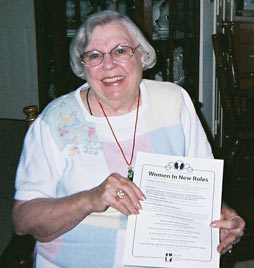By Katie Hudson-Martinez/feature editor
(Part 1 in a four-part series celebrating the 30th anniversary of the Women in New Roles Program.)

When Emily Lunday-Garrett founded the Women in New Roles program on South Campus in 1978, she never imagined that it would grow like a beautiful vine, enveloping women, making them strong and lifting them up to greater levels of self-awareness and inner peace.
But the program, now celebrating its 30th anniversary, has done just that for more than 4,000 women in Tarrant County.
These WINR women are young and old, from rich and poor backgrounds.
Some are widowed or divorced, are single moms or have made a lot of mistakes in their lives, but they all have one thing in common—a desire to better themselves.
“I owe my life to that program,” Karen Zapata, a WINR graduate who went on to become a Truman scholar and earn a master’s degree, said.
“I was coming from a very dark place, but they accepted me and they helped me. I am eternally grateful,” she said.
The two-class co-requisite course in human relations and applied psychology is for six transferable hours and leads women through a series of activities oriented in self-discovery.
“The girls do occupational research. They learn about stress management, conflict resolution, motivation and perception,” Triesha Light, who took over the program on South Campus after Garrett retired in 1988, said.
The students are encouraged to communicate with their instructors through journals.
“When I think of going inside one’s self, the best thing I ever did was keep journals,” Garrett said in a recent interview.
“The students would reveal things in those journals that they hadn’t told a soul, and I spent hours counseling the girls through writing,” she said.
Light said that the WINR students and advisers still communicate through journals.
“It’s (the journal) a good way to provide feedback, and it individualizes the class for each student,” she said.
Garrett founded the class after being divorced by her husband, who had run off with a younger woman.
She was struggling to find her new place in society.
“It’s funny because I never would have started the WINR program if I hadn’t been married to a jerk,” she said.
While serving as a counselor on South Campus, she became aware of the increasing number of women at TCC who also were struggling and in need of direction and support.
She desired more for those women than the homemaking courses offered by TCC at that time.
She said she would advise women looking for a career path about the same things today she did 30 years ago.
“I don’t think things have changed in that regard. I would still tell anyone to find something that is fulfilling, something you can be passionate about,” she said.
She said one thing that has changed is the opportunity for women in America.
“The glass ceiling has been broken,” she said. “Any field is appropriate for women now. The sky is the limit.”
Garrett recalls that even in the early days she had a lot of support from the faculty at TCC. She remembers fondly the monthly WINR luncheons where everyone brought a dish.
“I used to take [my container] to the delicatessen and have them fill it up,” she said smiling. “I am lucky no one ever asked me for the recipe.”
She does not remember the difficulties involved with starting the program.
“That is one thing I have let go of,” she said. “Whatever difficulties I had are in the past, and I don’t even remember them.”
Garrett, who now resides in a nursing home and suffers from Parkinson’s disease, still hears from some of her former students. She considers the 10 years she spent teaching in the WINR program a joy in her life.
“It’s wonderful the way the program has flourished and grown,” she said. “Of all the things I’ve done, the WINR program stands out as the acme of my life.”
For more information about the WINR program, contact Light at 817-515-4740.

























